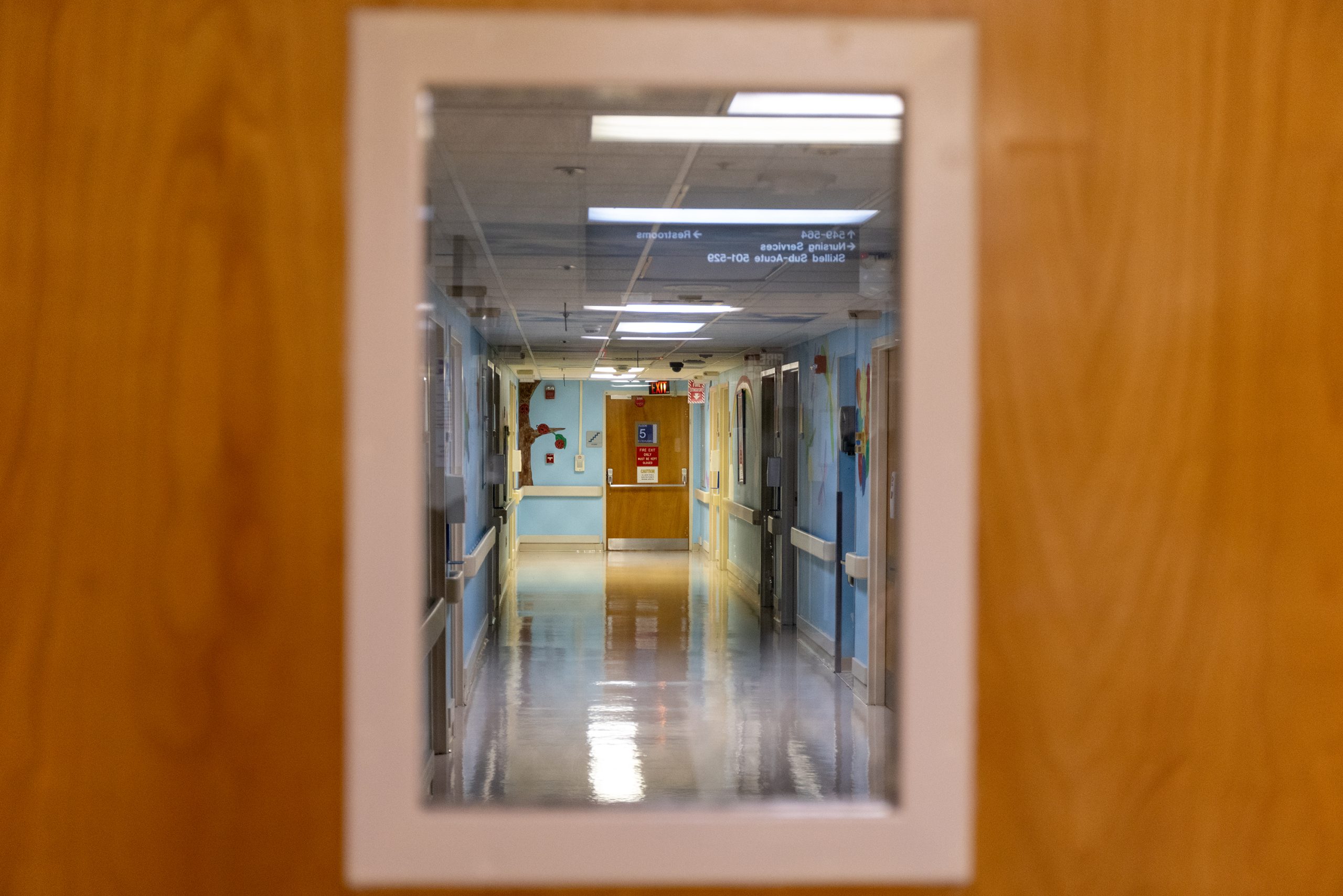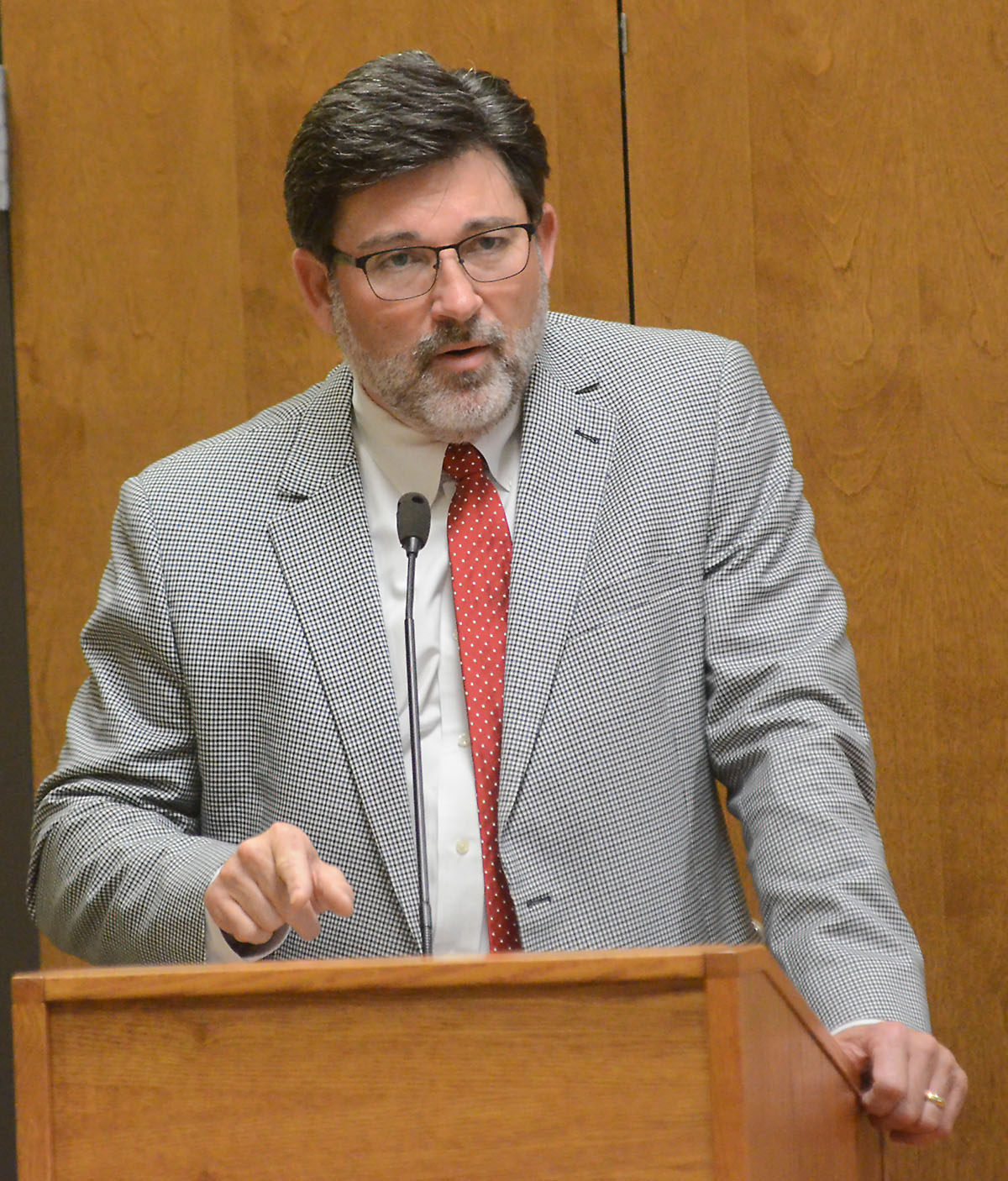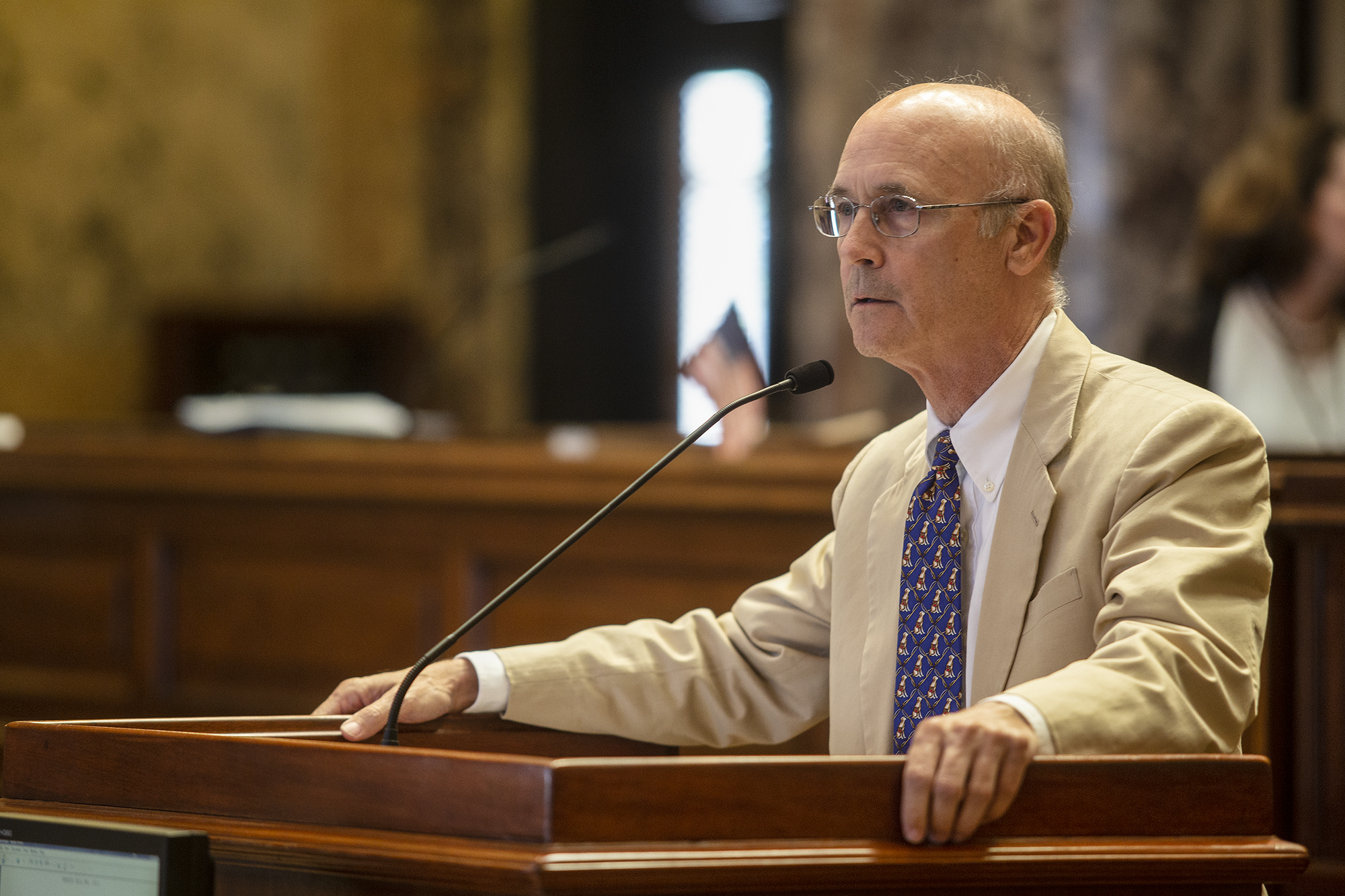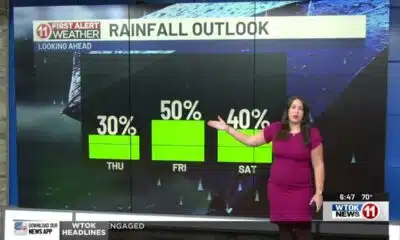Mississippi Today
Millions were supposed to go to Mississippi’s hospitals. Getting that money will be difficult for most, and impossible for others

What should have been a lifeline for Mississippi’s struggling hospitals is proving to be out of reach for the facilities that need it the most.
State lawmakers approved sending millions of dollars to save Mississippi’s struggling hospitals during the session, but now many hospital leaders are running into difficulties trying to access that money.
A third of Mississippi’s rural hospitals are at risk of closure — many of them were counting on the state grants to survive the year.
Legislators in February established the grant program, part of Lt. Gov. Delbert Hosemann’s plan to “save rural hospitals,” in lieu of expanding Medicaid. A month later and just days before the end of the legislative session, they decided on the amount: $103 million to be disseminated among the state’s struggling health care providers.
It was millions less than the Mississippi Hospital Association had advocated for — despite a $4 billion surplus in the state budget — but health care leaders said they would take what they could get.
Hospitals were allocated varying amounts through a formula that accounted for bed counts, hospital designation, emergency rooms and other factors.
But there was a hitch — the money wouldn’t come from the state general fund. Instead, it would come from American Rescue Plan Act funds, federal money meant to ease the financial hits taken by the pandemic.

MHA director Tim Moore, whose organization helped craft the program, said it wasn’t clear then how much the source of the money would affect hospitals’ ability to access it.
“I think the Legislature felt that it would not be a problem … to get the money out,” he said. “We were looking at them actually cutting grant checks to the hospitals. When ARPA money was applied, that changed the whole thing.”
ARPA funds can only be used to cover COVID-related expenses, and many hospitals have already claimed those federal pandemic reimbursement dollars. Expenses claimed through ARPA cannot have been claimed under any other federal and state reimbursement programs, rendering the grant money useless to many Mississippi hospitals.
According to Paul Black, CEO of Winston Medical Center in Louisville, that makes the grant bill more of a reimbursement bill.
“I don’t know who came up with the bright-eyed idea to use ARPA money, if they did, they definitely did not understand what that meant to this program,” he said.
“It’s just extremely frustrating that one of the pieces of the legislation … is one thing and the appropriations is something completely different. I don’t understand how they can do that, I really don’t.”
Both Hosemann and Gov. Tate Reeves, who sent out a release emphasizing his role in the program’s passage, declined to comment about the grant situation.
House Public Health Chair Sam Mims, author of House Bill 271 which funded the program, did not respond to a request for comment.
Senate Medicaid Chairman Kevin Blackwell, author of Senate Bill 2372 which established the program, deferred questions about hospitals’ issues with the grant program to state Health Officer Dr. Daniel Edney.
The state health department is tasked with distributing the funds, and because it’s now tied to federal ARPA funds, has to work with the state department of finance and administration to do so, Edney said.
During the bill process, Edney said the health department pointed out the pitfalls of using the ARPA money.
“Federal money … doesn’t take up state resources from other places,” he said. “The downside is it has to follow federal guidelines versus state general funds.”
One of those downsides has already become clear: The allocation based on hospitals’ number of licensed beds has been struck, on account of federal guidelines. That means hospitals, if they get money at all, will definitely be getting less than expected.

Senate Public Health Chair Hob Bryan said he’s received questions about the grant program from hospital officials and others, and that he still doesn’t have all the answers.
“I’ve asked questions, and I’m still confused,” Bryan said. “I talk with A, and A says one thing, then I talk with B, and B says something else.”
“I think there’s a lot of confusion over whether a hospital would have to have already spent money on COVID expenses and can be reimbursed, or whether they can spend in the future. One of the things I’ve been told is that if you are improving things at your hospital to deal with COVID, or to prepare for the next COVID, then you will be eligible under the regulations.
“Hospitals’ reactions appear to be, ‘That’s all well and good, but I’m going broke and this says I can spend more money and get reimbursed, but that doesn’t help me right now,’” Bryan continued.
Bryan said he believes questions and confusion about the program are in part because of the hasty, secretive process Mississippi legislative leaders have used to set budgets in recent years.
“We do everything in secret, and then put it all together at the last minute,” Bryan said. “Transparency, like say, in conference committees and the rest of the process might help, in that issues like this could be identified and addressed before it’s passed. Discussing these things more in the open could provide better results … Of course, we had the House refusing to negotiate on this or anything else because they were holding out for tax cuts, then they tried to do everything in the last 36 ½ minutes.”
Black agreed that hammering out funding details at the last-minute likely contributed to this oversight — an oversight that’ll have grave consequences for state’s hospitals.
“We got all these legislators that are patting themselves on the back for doing something for the hospitals,” Black said. “When it comes out, they didn’t do anything. At least for us to get what was promised in the Senate bill is not what is taking place now.”
Some of the state’s larger hospitals might be able to get their hands on some of the money. But it’s less likely that the state’s smaller, rural hospitals, who are in much more dire financial straits, will be able to.
“The whole intent of this was to help small rural hospitals,” Moore said. “That’s going to be much more of a challenge.”
Winston Medical Center was set to receive a little less than a million through the grant program. Because of the funding complications, the hospital actually won’t get anything at all.
“Unless the Department of Health comes up and finds out some way to get around some of the issues … as things sit right now, there’s no avenue for us to claim any money,” Black said.
The money would’ve been enough to cover about a month’s worth of payroll, Black said, but in the larger scheme of things, it would’ve helped Winston stay open until the end of the year and staunch the “slow bleed.”
Winston, though, is in a far more stable financial state than many other rural hospitals.
Before the grant money and a big credit line approval, Greenwood Leflore Hospital was weeks from shutting down. It’s not clear how the new developments will affect its financial viability.

Gary Marchand, the hospital’s leader, said it was too early in the process to answer Mississippi Today’s questions, but said he believes the complications caused by the ARPA funding will just slow down when the hospital will receive its allocation.
“We understand MSDH is moving quickly,” Marchand said.
Hospitals can apply for the money during a one-month window that starts June 1. Edney said once a hospital’s application is approved, he’s hoping to get the money over immediately.
However, Black is more cynical about the reality of the situation.
“That’s what they said when they passed the bill back in April, and now it’s the end of May going into June,” Black said. “If anybody gets it by September, it’ll be a miracle.”
Unless a special session is called to address the funding issue, Moore and Black are looking toward the next legislative session for help. They’re hoping that most hospitals survive until then and that state leaders come around to seeing the economic advantages to expanding Medicaid in Mississippi, which would bring millions of dollars to the state’s hospitals.
“The analogy I keep thinking about is Charlie Brown, Lucy and the football,” Black said. “Lucy holds the ball for Charlie Brown to kick, and at the last minute, she pulls it back. He falls on his rear end.
“That’s what this has been like.”
Reporter Geoff Pender contributed to this story.
This article first appeared on Mississippi Today and is republished here under a Creative Commons license.
Did you miss our previous article…
https://www.biloxinewsevents.com/?p=245957
Mississippi Today
Judge: Felony disenfranchisement a factor in ruling on Mississippi Supreme Court districts
The large number of Mississippians with voting rights stripped for life because they committed a disenfranchising felony was a significant factor in a federal judge determining that current state Supreme Court districts dilute Black voting strength.
U.S. District Judge Sharion Aycock, who was appointed to the federal bench by George W. Bush, last week ruled that Mississippi’s Supreme Court districts violate the federal Voting Rights Act and that the state cannot use the same maps in future elections.
Mississippi law establishes three Supreme Court districts, commonly referred to as the northern, central and southern districts. Voters elect three judges from each to the nine-member court. These districts have not been redrawn since 1987.
READ MORE: Mississippians ask U.S. Supreme court to strike state’s Jim Crow-era felony voting ban
The main district at issue in the case is the central district, which comprises many parts of the majority-Black Delta and the majority-Black Jackson Metro Area.
Several civil rights legal organizations filed a lawsuit on behalf of Black citizens, candidates, and elected officials, arguing that the central district does not provide Black voters with a realistic chance to elect a candidate of their choice.
The state defended the districts arguing the map allows a fair chance for Black candidates. Aycock sided with the plaintiffs and is allowing the Legislature to redraw the districts.
The attorney general’s office could appeal the ruling to the U.S. 5th Circuit Court of Appeals. A spokesperson for the office stated that the office is reviewing Aycock’s decision, but did not confirm whether the office plans to appeal.
In her ruling, Aycock cited the testimony of William Cooper, the plaintiff’s demographic and redistricting expert, who estimated that 56,000 felons were unable to vote statewide based on a review of court records from 1994 to 2017. He estimated 60% of those were determined to be Black Mississippians.
Cooper testified that the high number of people who were disenfranchised contributed to the Black voting age population falling below 50% in the central district.
Attorneys from Attorney General Lynn Fitch’s office defended the state. They disputed Cooper’s calculations, but Aycock rejected their arguments.
The AG’s office also said Aycock should not put much weight on the number of disenfranchised people because the U.S. Fifth Circuit Court of Appeals previously ruled that Mississippi’s disenfranchisement system doesn’t violate the Equal Protection Clause of the 14th Amendment.
Aycock, however, distinguished between the appellate court’s ruling that the system did not have racial discriminatory intent and the current issue of the practice having a racially discriminatory impact.
“Notably, though, that decision addressed only whether there was discriminatory intent as required to prove an Equal Protection claim,” Aycock wrote. “The Fifth Circuit did not conclude that Mississippi’s felon disenfranchisement laws have no racially disparate impact.”
Mississippi has one of the harshest disenfranchisement systems in the nation and a convoluted method for restoring voting rights to people.
Other than receiving a pardon from the governor, the only way for someone to regain their voting rights is if two-thirds of legislators from both chambers at the Capitol, the highest threshold in the Legislature, agree to restore their suffrage.
Lawmakers only consider about a dozen or so suffrage restoration bills during the session, and they’re typically among the last items lawmakers take up before they adjourn for the year.
Under the Mississippi Constitution, people convicted of a list of 10 types of felonies lose their voting rights for life. Opinions from the Mississippi Attorney General’s Office have since expanded the list of specific disenfranchising felonies to 23.
The practice of stripping voting rights away from people for life is a holdover from the Jim Crow era. The framers of the 1890 Mississippi Constitution believed Black people were most likely to commit certain crimes.
Leaders in the state House have attempted to overhaul the system, but none have gained any significant traction in both chambers at the Capitol.
Last year, House Constitution Chairman Price Wallace, a Republican from Mendenhall, advocated a constitutional amendment that would have removed nonviolent offenses from the list of disenfranchising felonies, but he never brought it up for a vote in the House.
Wallace and House Elections Chairman Noah Sanford, a Republican from Collins, are leading a study committee on Sept. 11 to explore reforms to the felony suffrage system and other voting legislation.
Wallace previously said on an episode of Mississippi Today’s “The Other Side” podcast that he believes the state should tackle the issue because one of his core values, part of his upbringing, is giving people a second chance, especially once they’ve made up for a mistake.
“This issue is not a Republican or Democratic issue,” Wallace said. “It allows a woman or a man, whatever the case may be, the opportunity to have their voice heard in their local elections. Like I said, they’re out there working. They’re paying taxes just like you and me. And yet they can’t have a decision in who represents them in their local government.”
This article first appeared on Mississippi Today and is republished here under a Creative Commons Attribution-NoDerivatives 4.0 International License.
The post Judge: Felony disenfranchisement a factor in ruling on Mississippi Supreme Court districts appeared first on mississippitoday.org
Note: The following A.I. based commentary is not part of the original article, reproduced above, but is offered in the hopes that it will promote greater media literacy and critical thinking, by making any potential bias more visible to the reader –Staff Editor.
Political Bias Rating: Center-Left
This article presents a focus on voting rights and racial justice issues, highlighting the impact of felony disenfranchisement on Black voters in Mississippi. It emphasizes civil rights concerns and critiques longstanding policies rooted in the Jim Crow era, which aligns with center-left perspectives advocating for expanded voting access and systemic reform. The coverage is factual and includes viewpoints from multiple sides, but the framing and emphasis on racial disparities and voting rights restoration suggest a center-left leaning.
Mississippi Today
Jackson police chief steps down to take another job, national search to come
Jackson Police Department Chief Joseph Wade told the mayor last week he was choosing to retire after 29 years of service and two years at the helm of the force. Wade said he’d been given another job opportunity, which has yet to be announced.
His last day is Sept. 5.
Mayor John Horhn said he told Wade the officer would be crazy not to take the job — one that comes with less stress and more pay.
“His wife has been on his back, his blood pressure has been up,” Horhn said during Tuesday’s City Council meeting. “He has done a commendable job.”
Wade became chief during a period in which Jackson was called the murder capital of America. Under his tenure, Wade said crime has fallen markedly, including a roughly 45% reduction in homicides so far this year compared to the same period in 2024, the Clarion Ledger reported. He said he’s also increased JPD’s force by 37, for a total of 258 officers.
Wade said his biggest accomplishment is reestablishing trust. “We are no longer the laughing stock of the law enforcement community,” he said.
The chief’s departure comes less than two months after Horhn took office, replacing former Mayor Chokwe Antar Lumumba who originally appointed Wade, and on the heels of a spate of shootings that Wade said were driven by gangs of young men.
“I have received so many calls from the community: ‘Chief, please don’t leave us,'” Wade told the crowd in council chambers.
But Wade said he “would rather leave prematurely than overstay my welcome,” adding that the average tenure of a police chief is 2.5 years.
Wade said that last year he stood next to Jackson Councilman Kenny Stokes and told the media he was going to cut crime in half, “And what did I do? Cut it in half,” he said.
“What I’ve seen in our community in some situations is people want police, but they don’t want to be policed,” Wade said.
Hinds County Sheriff Tyree Jones will serve as interim police chief until the administration finds a replacement. Jones said he has not finalized a contract with the city, responding to a question about whether he will draw a salary from both agencies.
“I could think of no one better than the sheriff of Hinds County,” Horhn said, adding that the appointment is temporary.
Jones said during the meeting that his responsibility as sheriff will continue uninterrupted and that his goal within JPD is to ensure continued professionalism in the department.
“I extend my heartfelt gratitude to my dear friend and retired police chief Joe Wade,” Jones said. “Again, let me be clear, I have no aspirations to permanently hold the position.”
Horhn said there is precedence for the dual role that “Chief Sheriff Jones is about to embark upon,” citing former mayor Frank Melton’s hiring of Sheriff Malcolm McMillin.
The city has enlisted help from former U.S. Marshal George White and the former chief of the Mississippi Highway Patrol, Col. Charles Haynes, to lead the Law Enforcement Task Force that will conduct a nationwide search to fill the position. The administration expects that to take between 30 and 60 days, according to a city press release.
The release said the task force will also examine safety challenges in Jackson more broadly, such as youth crime, drug crimes, departmental needs and interagency coordination.
“I am grateful that Marshal White and Col. Haynes have agreed to lead this important effort. Their breadth of experience, commitment to public safety and deep understanding of law enforcement challenges will ensure the task force conducts a rigorous search for our next chief,” said Horhn. “I am confident they will help shape solutions that address the evolving needs of Jackson.”
The city said it would soon release details about the opportunity for the public to offer input on the process.
“Hinds County is all in for whatever we have to do to make Jackson and Hinds County the safest it can be,” Hinds County Supervisors President Robert Graham said during the meeting.
Wade, who hails from nearby Terry, graduated from JPD’s 23rd recruit class in 1995, rising from a police recruit and hitting every rung of the ladder on his way to chief. “I was homegrown,” he said.
Wade said he received “an amazing offer in a private sector at an amazing organization. Don’t ask me where. That will be released at the appropriate time.”
This story may be updated.
This article first appeared on Mississippi Today and is republished here under a Creative Commons Attribution-NoDerivatives 4.0 International License.
The post Jackson police chief steps down to take another job, national search to come appeared first on mississippitoday.org
Note: The following A.I. based commentary is not part of the original article, reproduced above, but is offered in the hopes that it will promote greater media literacy and critical thinking, by making any potential bias more visible to the reader –Staff Editor.
Political Bias Rating: Centrist
The article presents a straightforward news report on the resignation of a police chief, focusing on facts, quotes from officials, and crime statistics without evident ideological framing. It covers perspectives from multiple local government figures and avoids partisan language, reflecting a neutral, balanced tone typical of centrist reporting.
Mississippi Today
Bluesky blocks access in Mississippi, citing free speech and privacy concerns over state law
Mississippians can no longer access the Bluesky app after the social media platform blocked access to users in the state.
Bluesky said on Friday that it made the decision after the U.S. Supreme Court declined for now to block a Mississippi state law that the platform said limits free expression, invades people’s privacy and unfairly targets smaller social media companies. The state law, passed in 2024, requires users of websites and other digital services to verify their age.
“The Supreme Court’s recent decision leaves us facing a hard reality: comply with Mississippi’s age assurance law—and make every Mississippi Bluesky user hand over sensitive personal information and undergo age checks to access the site—or risk massive fines,” the company wrote in a statement. “The law would also require us to identify and track which users are children, unlike our approach in other regions. We think this law creates challenges that go beyond its child safety goals, and creates significant barriers that limit free speech and disproportionately harm smaller platforms and emerging technologies.”
Mississippi Attorney General Lynn Fitch, whose office defended the law, told the justices that age verification could help protect young people from “sexual abuse, trafficking, physical violence, sextortion and more,” activities that the First Amendment does not protect.
The age verification law added Mississippi to a list of Republican-led states where similar legal challenges are playing out.
NetChoice is challenging laws passed in Mississippi and other states that require social media users to verify their ages, and asked the Supreme Court to keep the measure on hold while a lawsuit plays out.
That came after a federal judge prevented the 2024 law from taking effect. But a three-judge panel of the 5th Circuit U.S. Court of Appeals ruled in July that the law could be enforced while the lawsuit proceeds.
On Aug. 14, the Supreme Court rejected an emergency appeal from a tech industry group representing major platforms such as Facebook, X and YouTube.
There were no noted dissents from the brief, unsigned order. Justice Brett Kavanaugh wrote that there’s a good chance NetChoice will eventually succeed in showing that the law is unconstitutional, but hadn’t shown it must be blocked while the lawsuit unfolds.
Bluesky grew after the 2024 presidential election. Many users of X, which is owned by Elon Musk, retreated from the platform in response to the billionaire’s strong support of Donald Trump.
In Bluesky’s statement explaining its decision to block access in Mississippi, the company said age verification systems “require substantial infrastructure and developer time investments, complex privacy protections, and ongoing compliance monitoring — costs that can easily overwhelm smaller providers.”
“This dynamic entrenches existing big tech platforms while stifling the innovation and competition that benefits users,” the company added.
Bluesky said it did follow other digital safety regulations, such as the United Kingdom’s Online Safety Act. Under that statute, age checks are required only for accessing certain content and features, and Bluesky does not track which users are under 18, the platform said:
“Mississippi’s law, by contrast, would block everyone from accessing the site—teens and adults—unless they hand over sensitive information, and once they do, the law in Mississippi requires Bluesky to keep track of which users are children.”
The Mississippi law, authored by Rep. Jill Ford, a Republican from Madison, is called the “Walker Montgomery Protecting Children Online Act,” named after a Mississippi teen who reportedly committed suicide after an overseas online predator threatened to blackmail him.
The Associated Press contributed to this report
This article first appeared on Mississippi Today and is republished here under a Creative Commons Attribution-NoDerivatives 4.0 International License.
The post Bluesky blocks access in Mississippi, citing free speech and privacy concerns over state law appeared first on mississippitoday.org
Note: The following A.I. based commentary is not part of the original article, reproduced above, but is offered in the hopes that it will promote greater media literacy and critical thinking, by making any potential bias more visible to the reader –Staff Editor.
Political Bias Rating: Center-Left
The content presents a perspective that emphasizes concerns about free speech, privacy, and the impact of government regulation on smaller tech companies, which aligns with a more progressive or liberal viewpoint on digital rights and corporate regulation. It critiques a Republican-led state law as potentially overreaching and harmful to innovation, while also acknowledging the law’s intent to protect children. The balanced presentation of both sides, with a slight emphasis on the tech platform’s viewpoint and civil liberties, suggests a center-left bias.
-
News from the South - Texas News Feed5 days ago
DEA agents uncover 'torture chamber,' buried drugs and bones at Kentucky home
-
News from the South - Missouri News Feed7 days ago
Missouri settles lawsuit over prison isolation policies for people with HIV
-
Local News6 days ago
Florida must stop expanding ‘Alligator Alcatraz’ immigration center, judge says
-
News from the South - Texas News Feed3 days ago
Racism Wrapped in Rural Warmth
-
The Center Square6 days ago
Georgia ICE arrests up 367 percent from 2021, making for ‘safer streets, open jobs | Georgia
-
News from the South - Kentucky News Feed6 days ago
Quintissa Peake, ‘sickle cell warrior’ and champion for blood donation, dies at 44
-
Our Mississippi Home6 days ago
The Dixon: Writing a New Story for Main Street in Natchez
-
News from the South - Oklahoma News Feed6 days ago
Tom Cole’s Powerful Spot on the Appropriations Committee Is Motivating Him to Stay in Congress
















































